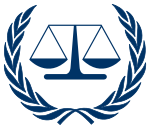Völkerstrafgesetzbuch
The Völkerstrafgesetzbuch or VStGB ("Code of Crimes against International Law") is the German law that regulates the crimes against public international law. It was created to bring the German criminal law into accordance with the Rome Statute of the International Criminal Court. It was announced on 26 June 2002 and became law 30 June 2002. It covers the following offenses:
- Genocide (§ 6)
- Crimes against humanity (§ 7)
- War crimes (§§ 8–12)
None of these are subject to a statute of limitations.
According to § 1, genocide, crimes against humanity, and war crimes are subject to universal jurisdiction, thus German courts can punish offenses committed by foreign citizens abroad. Prosecutorial jurisdiction lies with the Public Prosecutor General. The prosecution of crimes committed outside German jurisdiction is limited by § 153(f) of the German Criminal Procedural Code, which gives the Public Prosecutor General a wide discretion of when to open a case via universal jurisdiction, if the offender is not of German nationality. So far the Public Prosecutor General's office has suspended persecator[clarification needed] measures for 128 cases brought to its attention involving international crimes pursuant to the German International Criminal Code.[citation needed]
In May 2011, the trial of two Rwandan citizens, Ignace Murwanashyaka and Straton Musoni, began before the Oberlandesgericht in Stuttgart, Germany. This is the first trial under the Völkerstrafgesetzbuch in Germany.[1][2] In September 2015, the accused where sentenced to 13 and 8 years in prison.[3]
References
- ^ "Rwanda: Ignace Murwanashyaka and Straton Musoni tried". BBC. 4 May 2011. Retrieved 5 May 2011.
- ^ "Oberlandesgericht Stuttgart (5. Strafsenat) eröffnet Hauptverfahren gegen zwei mutmaßliche Führungsfunktionäre der "Forces Démocratiques de Libération du Rwanda" (FDLR )". Oberlandesgericht Stuttgart (in German). 4 March 2011. Retrieved 5 May 2011.
- ^ "Conviction of FDLR leaders by German Court". Armed Groups and International Law. 28 September 2015. Retrieved 1 October 2015.
See also
External links
